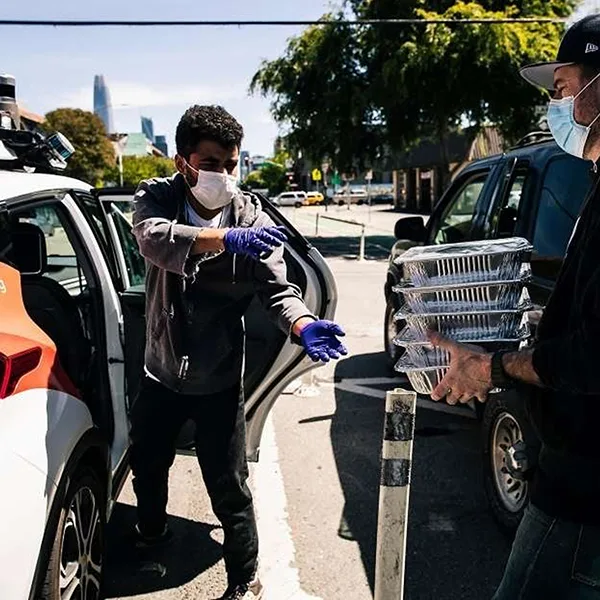
Originally published on San Francisco Business Times.
When Cruise’s all-electric autonomous vehicles began logging their first miles on San Francisco streets, they weren’t taxiing ride-seekers to jobs, shops or bars. The cars, known as AVs, were delivering free groceries and meals to the city’s low-income residents.
It was the early days of the pandemic, when food insecurity was climbing at alarming rates. The number of households relying on the San Francisco-Marin Food Bank had nearly doubled from 32,000 a week to almost 60,000, according to Amanda Lenaghan, Cruise’s head of Social Impact. “Our Cruise AVs were able to help the food bank quickly scale their deliveries in order to meet that increasing need,” Lenaghan said.
Two years later, food insecurity still remains an issue in San Francisco. People relying on food assistance programs has risen 42 percent since 2019. To serve those in need, Cruise continues to partner with both the SF-Marin Food Bank and SF New Deal as part of its Cruise For Good social impact program. The company declined to disclose the value of the partnership.
Cruise AVs deliver food to homebound seniors, people with disabilities, struggling young families that can’t travel to food banks, and nonprofit food distribution services. To date, Cruise AVs have made more than 127,000 food deliveries using 100 percent clean energy. Of the 2 million meals Cruise For Good has delivered, 80 percent have gone to households living below the poverty level.
These families, as well as the SF-Marin Food Bank and SF New Deal, were actually Cruise’s first customers. Cruise, started in 2013 and majority owned by General Motors, manufactures all-electric self-driving vehicles that harness renewable energy. The company, which has raised more than $15 billion to date, in June it became the first autonomous vehicle company to offer fared rides to the public in San Francisco.
“Cruise is in the early stages,” Lenaghan explained. “It’s exciting to have already made these commitments to the community and to have baked social impact into our DNA.”
“In March 2020, we needed to pivot our services quickly to support a community sheltering in place, and our Home-Delivered Groceries program grew from serving a couple thousand households to serving over 10,000 households each week. Cruise was one of our earliest partners in Home-Delivered Groceries – they came to us right at the start of the pandemic and asked, “how can our technology help?” Their continued partnership is a testament to how companies can use innovative tech in partnership with community organizations to make a profound impact on the lives of so many people.”
“As we look forward, we know the impacts of Covid-19 will be with us for a long time,” said Michael Wirkkala, chief operating officer at San Francisco-Marin Food Bank. “Even now, more than two years into the pandemic, our Home-Delivered Groceries service has remained steady at more than 10,000 deliveries every week. Big challenges like food insecurity are more complex than many people realize, and tackling them requires innovation and collaboration.”
In addition to launching Cruise For Good, Cruise has joined Pledge 1%, a global philanthropic movement that encourages companies to adopt business paradigms that include social impact programs. Through this partnership, Cruise has made a commitment to dedicate at least 1 percent of its fleet to give back to the communities it serves.
“We’re really pleased to be the first AV company that’s a part of the Pledge 1% movement,” Lenaghan said. “For Cruise being early in this nascent industry, we not only can think about how we can address issues facing our community today, but also how we can influence others in our industry to think similarly.” Looking forward, Cruise will continue its commitment to fighting food insecurity and is also looking at ways to contribute to workforce development, Lenaghan said: “This is just the beginning.”
Read article on the San Francisco Business Times.
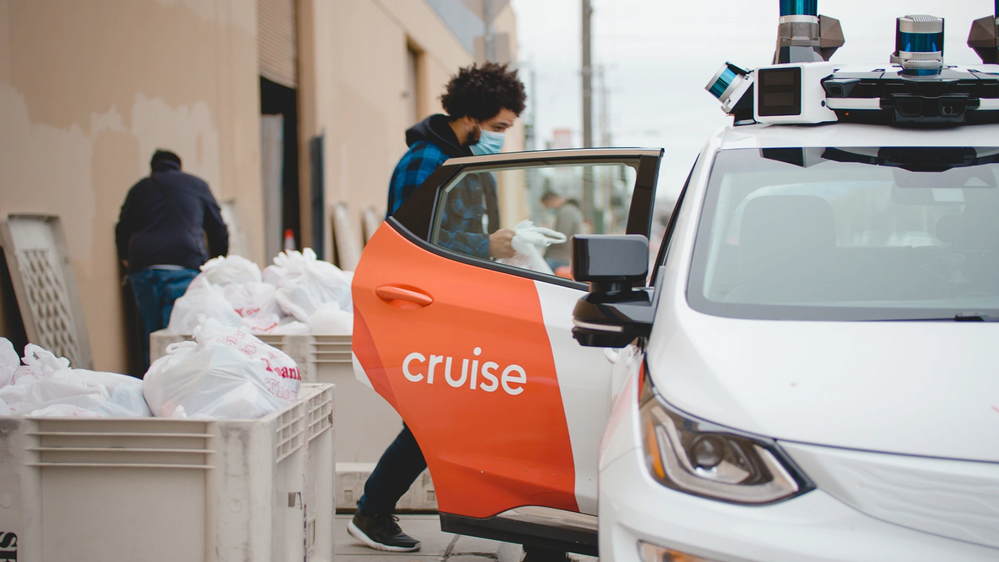
Originally published on Cruise.
What could we achieve if companies made social impact core to their business strategy?
That question has guided Cruise’s social impact philosophy from the start. The answer is stretching our conceptions of how AVs can and should serve our communities — and how quickly we could make an impact.
When COVID-19 first hit and food insecurity skyrocketed in San Francisco, it became clear we could make an immediate positive contribution with our fleet. We decided the most effective way to support our neighbors was to plug in with community organizations who had expertise fighting food insecurity. As a result, we launched two long-term partnerships in early 2020, with the San Francisco-Marin Food Bank and the SF New Deal, to deliver meals to residents in need, while also helping local restaurants. Nearly two and a half years later, our fleet of AVs has now delivered more than two million meals (and counting) to residents most in need in San Francisco, as part of our signature social impact program, Cruise for Good.
Yesterday, we were humbled that the San Francisco Business Times recognized Cruise with the 2022 ‘Beyond the Check’ Award in the Community Impact category. This award is the result of collaboration between many people and many teams – across multiple organizations. While we’re proud of our commitment to uplifting the communities where we operate, we wanted to take this opportunity to acknowledge our partners, the SF New Deal and San Francisco-Marin Food Bank, and share more about what we’ve learned through these partnerships. After all, it’s their willingness and commitment to innovate with us, respond quickly to community needs, and adapt to evolving pandemic dynamics that have made this collective impact possible.
What we’ve accomplished together, so far
Together, we have delivered 2.2 million meals to residents across San Francisco. What does that number look like when broken down? It equates to 120,000 deliveries, 80% of which are delivered to zip codes below the poverty line. And because our fleet is all electric, and powered by 100% renewable energy, we’ve offset more than 100 metric tons of CO2 emissions.
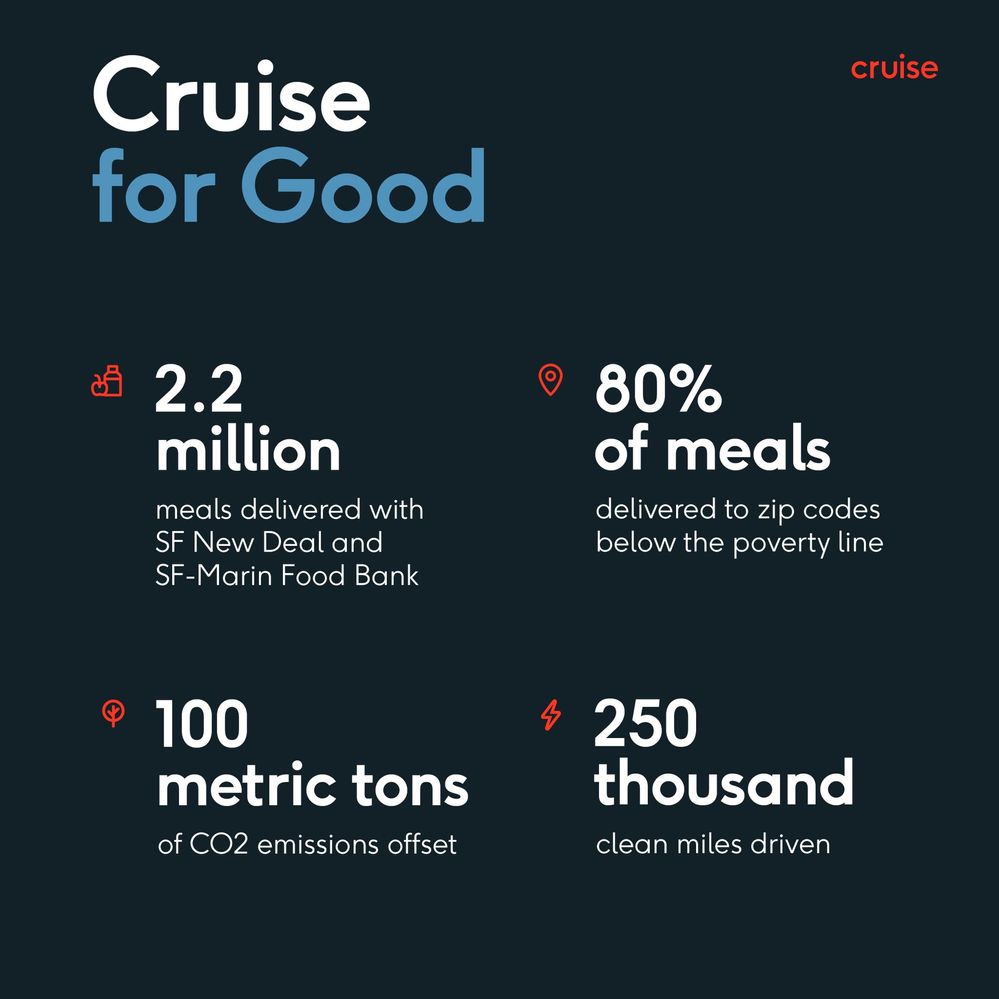
Many of our deliveries with the SF New Deal also support local, small businesses, like Old Skool Cafe, a San Francisco restaurant that also provides workforce training for justice involved youth.
Learn more about Cruise’s innovation through partnership and their commitment to social impact here.

Originally posted on Entrepreneur.
Corporate success is no longer measured just in dollars and cents. Investors, employees and customers alike are all paying closer attention to non-financial factors like environmental, social and governance standards.
Last year, I went to our board with the idea of joining the 1% Pledge, a global movement to support our community investments and philanthropy. The big idea is to pledge 1% of our employee’s time, 1% of our products and capabilities, 1% of our profits and 1% of our entire equity. Our goal as the first Canadian public company to launch this major initiative, is to inspire, educate and empower all companies to leverage their assets for good.
It was on the run-up to our IPO, so we were asking a lot by traditional business metrics. But without hesitation, our board and investors were on board. Along with our leadership, they understood that investing 1% of our company’s profits, time, product and equity to support charities and causes in our community will pay its own dividends. And that’s okay, because what’s good for business can be great for society, for the planet, for people and for prosperity.
Corporate success is no longer measured just in dollars and cents. An organization’s market value is still measured by its stock price, or determined by its valued assets, its position in the market, its unique distinctive competence, the value it brings to its customers and its market potential. However, investors and employees — and customers — are paying closer attention to how you do business, along with how well you do it and what you deliver.
Increasingly, non-financial factors or environmental, social and governance (ESG) standards are being used to evaluate companies for a cultural fit and identify risk and/or growth opportunities. To ensure your organization meets these new standards, you must start by instilling a sense of purpose and accountability within your people, one that is genuine and purposeful.
When you instill purpose, everything else follows
If you think in terms of two bottom lines, let’s call them EBITDA and ESG, how do you find a middle ground that ensures both expectations are met? You can do this by instilling a set of purpose-based values.
Around the world, companies have made billions of dollars by simply connecting people, inspiring them to work together and caring for them. You can’t build an effective organization unless you mobilize people around a common purpose, one that’s meaningful to them and society, and ideally one that’s beyond what the company does all day, every day. Employees shine brightest when they share common goals and beliefs beyond their day-to-day roles.
Of course, making ESG a sustainable corporate competency means making it core to your company’s culture. You can’t achieve that with a slogan or a slide. You have to demonstrate, often daily, your commitment to doing well by doing good. The aim is for employees to feel that working together to support goals for their community and not just the company is not only encouraged, but expected. The shared purpose builds cohesion and engagement, driving loyalty, innovation and growth.
Make a lasting impact in our community
Part of the challenge is finding a sense of purpose that fits your company and culture and unites your team. Finding that sense of shared purpose can and should be part of the journey.
When my company took the 1% pledge, it started as a commitment to philanthropic leadership and supporting a global ESG initiative. This helped us to quickly find our focus: the democratization of knowledge through education and technology.
Equal, accessible and unconstrained access to knowledge is a key lever for human wellness, combats poverty, reduces inequalities and bolsters purpose. Now we are rolling up our sleeves and starting to work with local programs that put this ideal into action. Our aim is to open new doors in our community by democratizing business with access to technology and using educational and employment opportunities as tactics for combating inequality. We truly believe that when everyone has access to the tools and resources they need to succeed in business or education, we all benefit.
The benefits of committing to ESG
I care about being a good citizen and the wellness of our people and customers, and I’m grateful for the opportunity to use our company’s success to make the world a better place. Giving back and being part of the solution unites our company and shapes our culture, and increasingly our customers agree and engage.
But adopting an ESG strategy requires commitment. It’s key to establish metrics, measure them on a regular basis, and share progress publicly. You have to make sure you walk the walk. The good news is that ESG success has a positive impact on so many levels: for the community, planet, employees and company. We’ve found that embracing an ESG strategy, substantiated by the 1% pledge, has been an important way to attract talented people, customers and partners who have the same desire of building a better world. And that’s helping us build both a stronger business and brighter future.
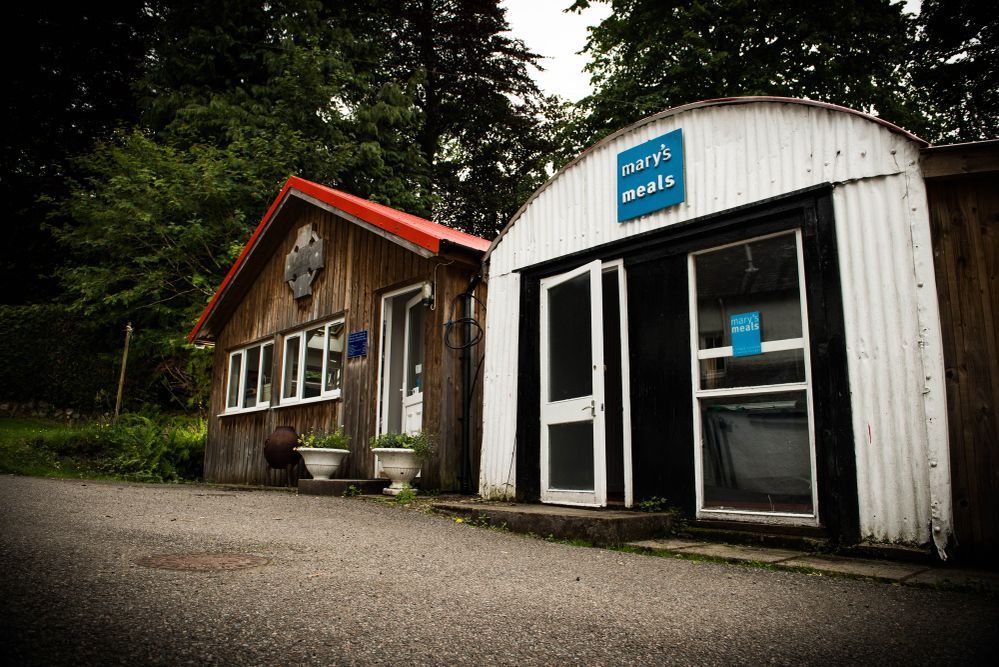
Originally published on New Verve Consulting.
New Verve Consulting:
Today, we’re highlighting one of our customer success stories, Mary’s Meals, and how they used Jira Service Management along with Insight to deliver greater value today with the help of New Verve Consulting. We also chose Mary’s Meals as our Pledge 1% charity of choice last year, too!
Read on to hear from IT Infrastructure Lead Stephen Neil on how he approached the transformation and the myriad of benefits through JSM and Confluence, and don’t miss New Verve’s founder and CEO, Nigel Rochford, discussing advocacy in long-term partnership as well.
Click here to learn more about Mary’s Meals Stephen Neil and Founder and CEO of New Verve Nigel Rochford discuss how they were able to scale impact for Mary’s Meals using Jira Service Management.
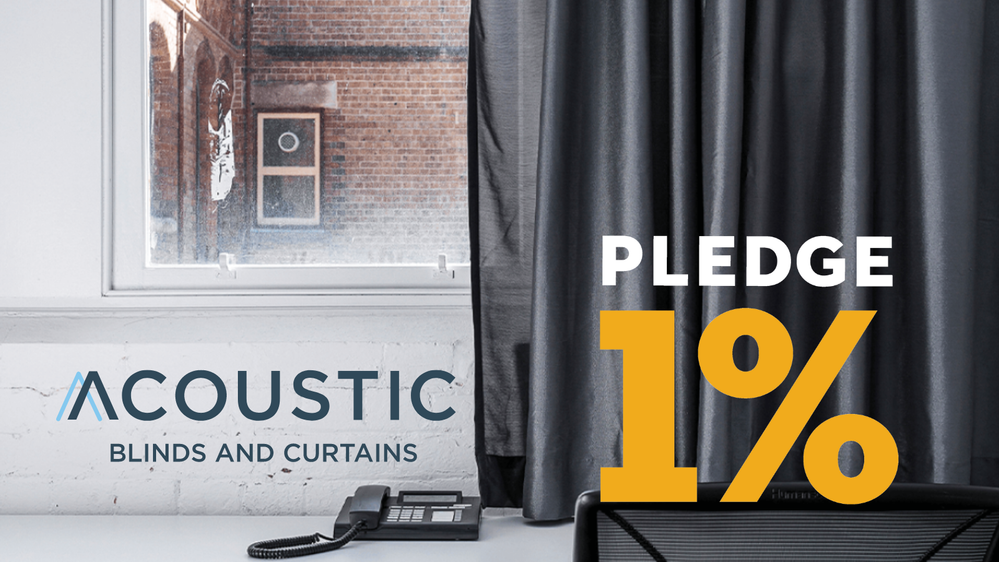
Pledge 1% would like to extend a warm welcome to the newest member of our Pledge 1% community, Acoustic Blinds and Curtains.
As a part of their time pledge, they are corporate volunteers at Chatswood Library, Sydney. At Chatswood library, the Acoustic Blinds and Curtains team deliver the Be Connected digital literacy program up to 1-2 times per year.
As a part of their product pledge, Acoustic Blinds and Curtains have implemented a reuse and recycling program which offers drop off points for their products at end of life to create a true circular economy. Products are then cleaned, re-hemmed and reused through a social partnership with Redlink. Redlink is an integrated, support and services hub, that strives to increase social inclusion and improve wellbeing, particularly for the most vulnerable and socially isolated residents of Redfern, Sydney. Those products that cannot be reused, are recycled with Textile Recyclers Australia. Textile Recyclers Australia or TRA is more than just a recycling company, TRA collaborates to find circular solutions for unwanted textiles. Providing recycling solutions for fashion, uniforms and other textiles whilst creating ‘closed loop’ programs one garment at a time. This program is connected to the company’s sustainability goals.
Acoustic Blinds and Curtains donates 1% of net profit each year to Effective Altruism. Everyone wants to do good, but many ways of doing good are ineffective or actively harmful. The Effective Altruism movement arose out of a desire to make sure that attempts to do good actually work.
This led to many ideas like the following:
– When choosing what to fund or work on, we shouldn’t go for what’s most personal or accessible to us.
– We should focus on problems that are important, neglected, and tractable (which we can actually do something about).
– We should evaluate the work that charities do, and value transparency and good evidence.
“We believe that business can be a force for good – and we want our business to have a positive impact on the world – beyond our customers. We want to make philanthropy and sustainability a pillar of our business because we think it’s the right thing to do – and we believe that our customers care about impact and sustainability too!”
About Acoustic Blinds and Curtains
Acoustic Blinds and Curtains is THE brand for Acoustic Blinds and Curtains in Australia.
They offer acoustic solutions in window furnishings – with an industry-leading range of acoustic fabrics, including exclusive fabrics, and a custom noise reduction solution. Their mission is to help the world sleep soundly and hear clearly. Their vision is to create acoustic environments that inspire happy, healthy and productive living.
Learn more about Acoustic Blinds and Curtains and their sustainability goals.
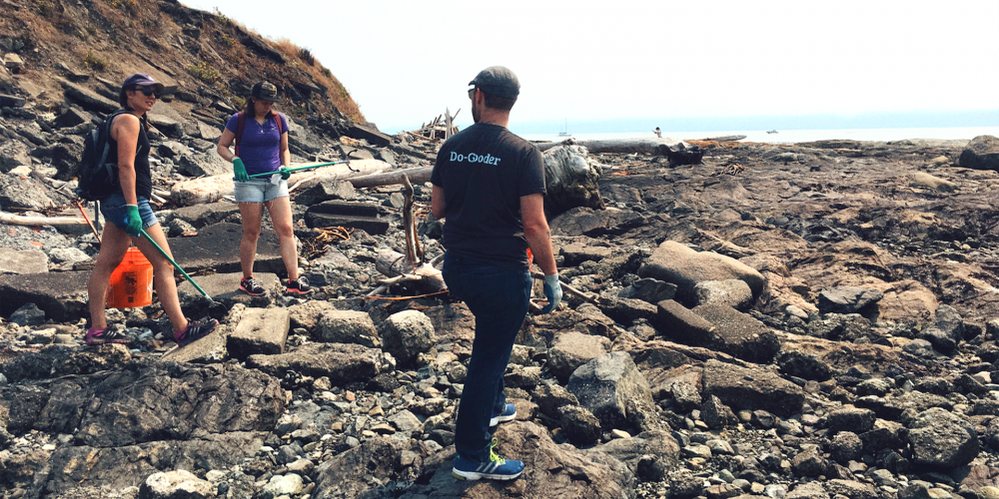
Originally published on Benevity.
Creating community
Founded in 2002, Sydney, Australia–based Atlassian creates product management and documentation software — including Jira and Trello — that’s used by thousands of teams worldwide.
Atlassian’s own team has experienced tremendous growth. Over a three-year period, amid the pandemic, the company doubled its workforce, making it the largest software company in Australia, and one of Benevity’s biggest clients in the region.
With employees in over 27 countries and in a broad spectrum of roles, Atlassian needed a way to create community for their people and inspire them to live the company’s mission to “unleash the potential of every team.” One influential lever for employee engagement has always been the Atlassian Foundation.
Atlassian’s dedication to purpose started early, when company founders committed to Pledge 1%. Atlassian contributes 1% of employee time, company equity, products and annual profits to the Atlassian Foundation. The Foundation, in turn, provides funding and resources to support donations to education-focused causes, volunteering in local communities and donations of Atlassian products to nonprofits.
When Atlassian began using Benevity’s corporate social responsibility software in 2018, its employee engagement tool, Spark, enabled them to develop more robust giving and volunteering initiatives. And with Benevity Reporting, they had access to richer, more accurate reports for measuring their impact. Both solutions helped to grow their program, while identifying how they could evolve.
Pledge 1%’s #WomenWhoLead series celebrates female leaders who are paving the way for the next generation. While our featured leaders come from a variety of backgrounds and industries, they are united in their efforts to promote equality for all women in the workplace. We’ve asked them to share a bit about their journey to success, as well as lessons they’ve learned along the way.
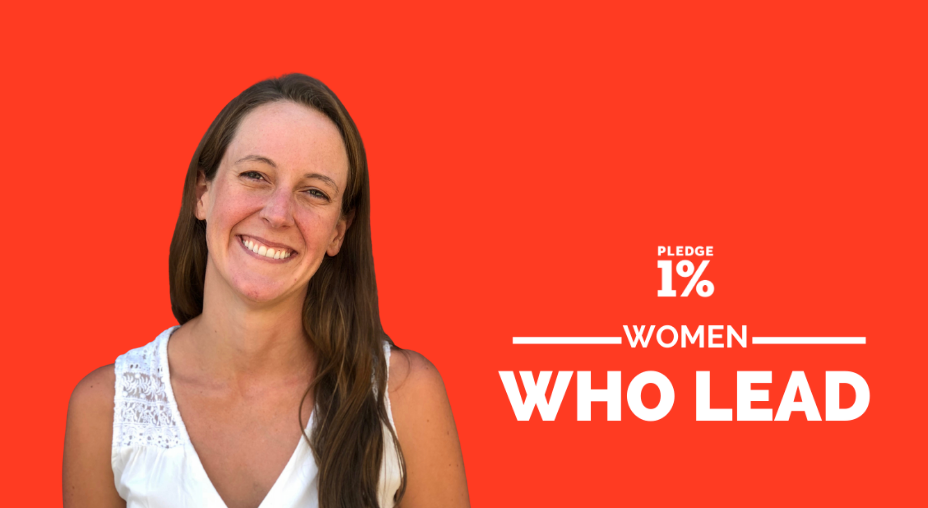
Molly Emmett
Data Scientist, Atrium
Denver, Colorado, United States
What is your current role? Briefly describe in 1-2 sentences.
As a data scientist at Atrium, I work with clients to design, build, and productionize models. I also work with a nonprofit to optimize their data definition, capture, and analysis.
What’s the best part of your job? What do you enjoy the most?
I get to help build Atrium’s Cultivate program, which focuses on supporting nonprofits. I became a data scientist in order to deepen my technical skills and bring those skills back to the social impact arena. Thinking about how to render social impact an integral part of the business context is a meaningful way to bridge my previous and current experiences.
We’ve all faced personal and professional challenges these past two years – what motivates you to keep going?
When I feel like I’m running down personally or professionally, I think about my former students. Some of them faced significant hardship, and if they could show up to school with humor and goodwill, I can get up and keep going in their example.
What does generosity mean to you?
Generosity is both personal and structural. In any given interaction, and increasingly so as online interaction is normalized, we only see a fraction of a person. Recognizing that we don’t know a person’s entire history or even what their day has been like is an important practice of generosity that can be logically extended to encompass structural generosity that does not make presumptions about people and groups in need.
How do you feel businesses can play a larger role in solving today’s biggest challenges? Do you have any specific stories or examples from your work or colleagues you can share?
One way that businesses can play a larger role in solving social and environmental challenges is by actively listening to the experts in those arenas. Individuals who work directly with people in need or who have been focused on climate change may have deep understanding of the subtleties of these issues. Asking questions of the people who are being served or the people who, for example, farm or otherwise create the product that is being sold is essential to doing relevant good as opposed to strictly intentional good.
If you could pick a song to guide you through 2022, which song would it be?
Bruce Springsteen’s Dancing in the Dark. I love this song’s acknowledgement of sadness and frustration. We’ve all been confronted with circumstantial uncertainty over the past couple of years, and there’s something to be said for openly expressing the arduousness of that and picking yourself and others up in whatever ways you can (…and I love The Boss).
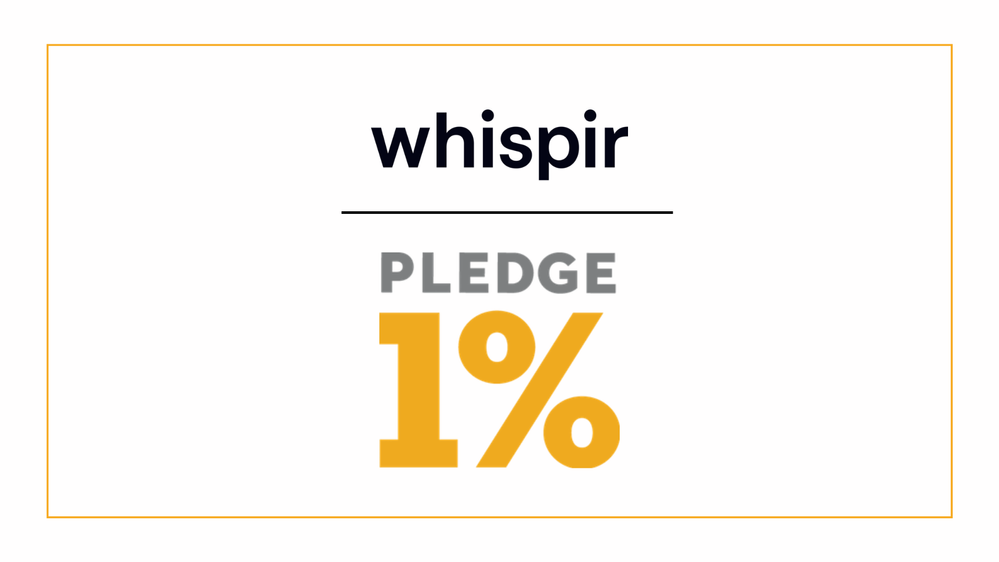
Pledge 1% is proud to announce that Whispir, a communications intelligence company, has joined Pledge 1%, a global movement creating a new normal where companies of all sizes integrate giving back into their culture and values. Whispir believes that tech has a big role to play in helping those that need it most. That’s why Whispir has signed the 1% pledge. As a part of the pledge, all Whispir employees receive 3 days of Volunteer Leave per year, which can be donated to charities and not-for-profits inside normal working hours. Whispir will also offer an NFP version of their product, which includes discounted SMS, a 50% discount on their software, and pro-bono support for any eligible NFP organization or charity.
Their commitment to social impact through Whispir for Impact exists to bring the best of Whispir to over 200 charities, not-for-profits, and public sector organizations striving to do more with technology, partnerships, and collaboration. Through this commitment they hope to apply technology, intellectual property, processes, and capabilities to improve lives. In addition, their dedicated volunteer program allows employees to donate thousands of hours annually to make a difference within the communities they serve. Whispir has everything you need to create powerful omnichannel communications across SMS, email, social, video, voice, and more. With the goal of increasing impact, Whispir works to help organizations of all sizes humanize their communication.
About Whispir
Whispir was founded in 2001 with a mission to build a world that communicates more humanly. Today they serve over 800 customers and support the delivery of more than two billion interactions worldwide. Whispir’s promise is the world’s highest engagement rates by bringing together the smartest minds with a clear vision for what technology can achieve—using the power of machine intelligence and carefully developed algorithms for effective human engagement at scale. As a communication intelligence company that brings people closer together, they solve problems, advance ideas, and achieve their mission through a scalable platform that can solve even the most complex business problems and delivering the highest possible engagement scores for some of the best known companies and organizations in the world.
Learn more about Whispir, and Whispir for Impact.
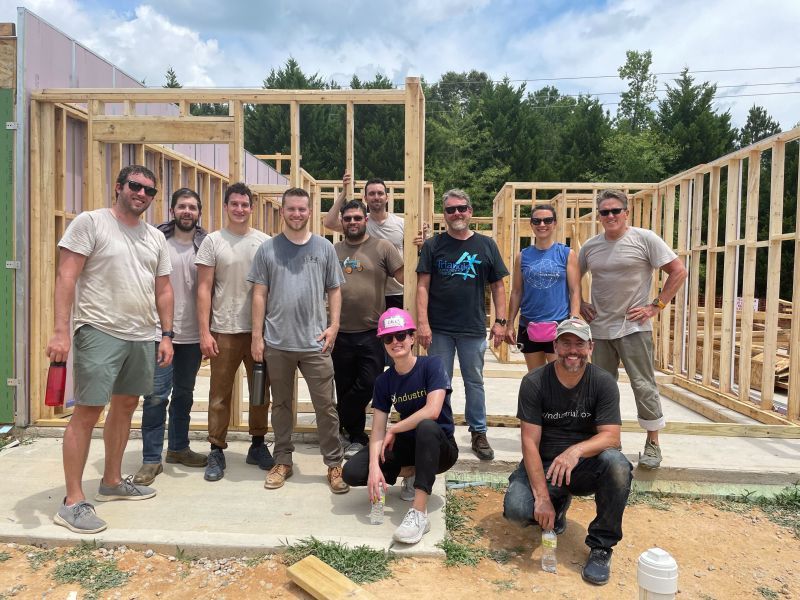
Pledge 1% is proud to announce that Ndustrial is now a member of the #Pledge1 community, and has joined a global movement creating a new normal where companies of all sizes integrate giving back into their culture and values.
Ndustrial is donating 1% of their employees’ time to charitable causes like the Habitat for Humanity International project last month.
Pledge 1 is a global movement creating a new normal where companies of all sizes integrate giving back into their culture and values. We are proud to be part of this movement alongside great companies like our friends at Atlassian.
“We are dedicated not only to rooting out waste in the industrial sector, but also to being a great place for people to grow and thrive, to have fun and feel part of a community, and to give back. Learn more about our journey at Ndustrial.”
About Ndustrial
Ndustrial delivers the industry’s only production-first energy intensity platform – enabling companies to minimize energy spend and achieve the highest production efficiency possible. Together with their IoT and energy service offerings, Ndustrial delivers new levels of insight and provide a holistic view across all enterprise facilities. Learn more about Ndustrial.